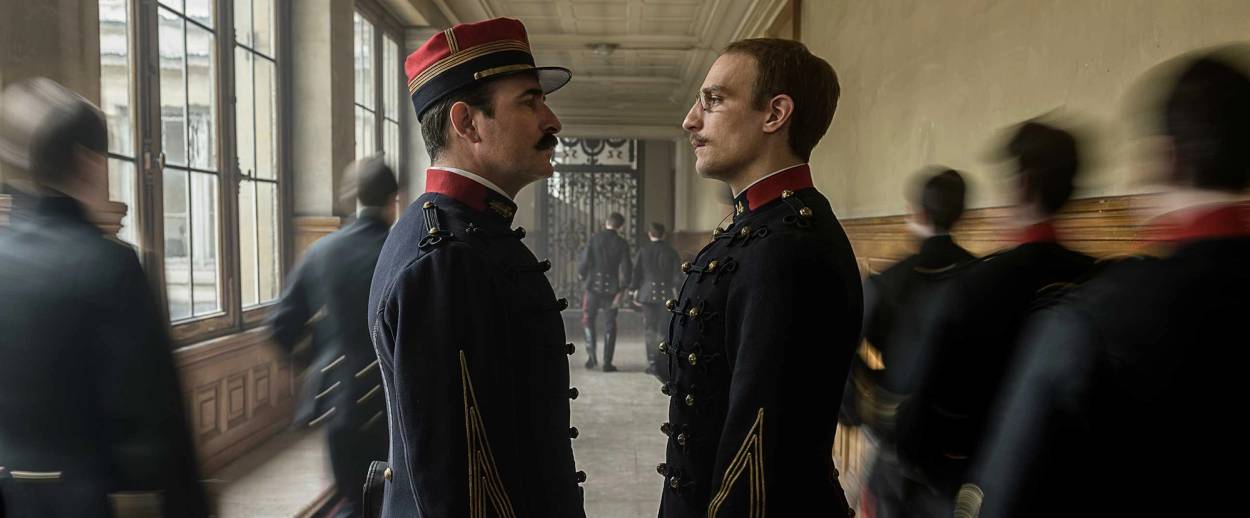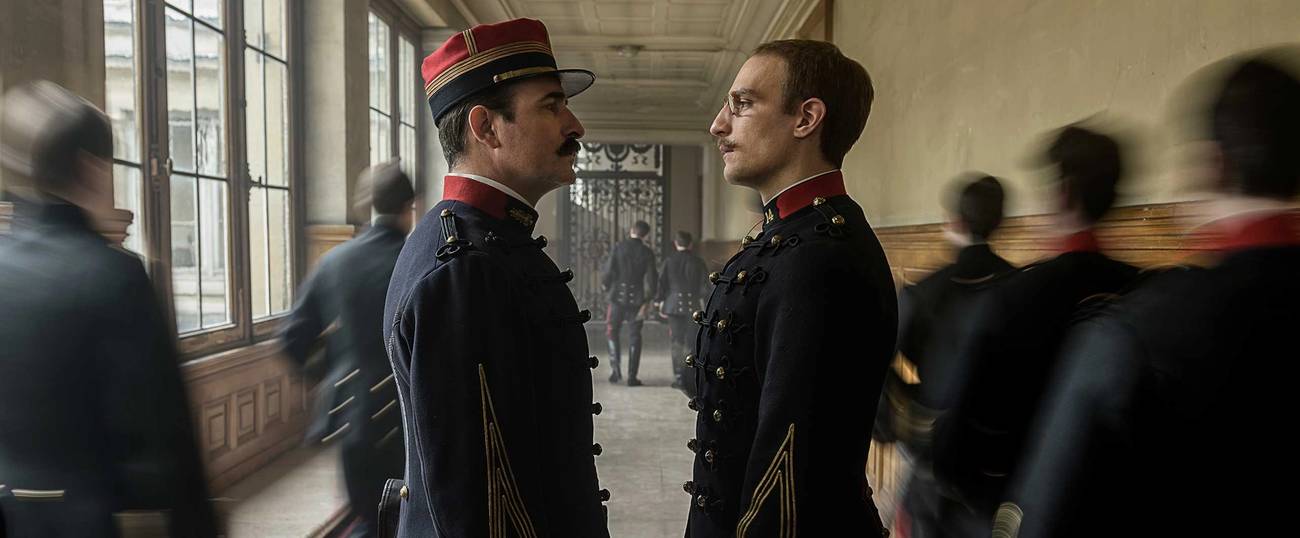Roman Polanski’s Dreyfus
Why the filmmaker’s depiction of early-20th-century anti-Semitism in ‘J’accuse’ is, with reservations, ‘important and beautiful’




I would like to talk here not about Roman Polanski but about Roman Polanski’s new film, J’accuse (An Officer and a Spy), which he dedicates to that key moment in French history, the Dreyfus affair.
I have an objection to this film.
And the objection has to do with the treatment of the character of Dreyfus himself, the victim of the affair and the original European prototype for all judicial errors.
Why film him in halftone, wishy-washy, crushed by his destiny, unsympathetic?
Did Polanski buy the legend created by Georges Clémenceau, future “father of victory” of 1918: “Picquart is a hero, Dreyfus is a victim”?
By Léon Blum: “if Dreyfus weren’t Dreyfus, he might not have been a Dreyfusard”?
By the poet Charles Péguy: Dreyfus, this poor “inhabitant” of the grand Dreyfusard “idea”?
The fact remains that Polanski’s portrait of Dreyfus as a deceiving anti-hero, not up to his cause, is erroneous.
And I am left hungering for a different film: Dreyfus in flesh and cold blood; the Dreyfus whose personality of tempered steel held strong on Devil’s Island and who accepted grace only to fight, without ceding or losing anything, for his rehabilitation; the Dreyfus we speak too little about who, in the years following the affair, was deep in all the battles the liberals fought over the nascent rights of man—here, for a French dockworker condemned to death; there, for the soldier Emile Rousset, unjustly found guilty by a war tribunal in Algeria; or, there again, for the American anarchists Sacco and Vanzetti, sent to the electric chair …
But, with that reservation, this film is important and beautiful.
Beautiful, in its portrait of a French military apparatus bowed over its judicial error, and remediating it through coarse falsehoods: And what if the France of 1895 were the inventor of Fake News?
Beautiful, and just, in its description of France as stinking of anti-Semitism, haunted by its venom as the anti-Dreyfusard Colonel Sandherr was by the pox, hurling his hatred of Jews, on the steps of the courthouse as well as in the press, with a cold, quiet hysteria: “moldy France,” as the French writer Philippe Sollers said; “the French ideology,” as I said myself, nearly 40 years ago, in a book that I dedicated to “transcendental Petain-ism” that cuts across all of modern French history.
Admirable and, suddenly, so revealing, the scene where we see, in Paris, an autodafé of the newspaper L’Aurore, which had just published Emile Zola’s “J’accuse,” as well as an attack against a shop tagged with “Jewish Boutique” and “Death to Jews”: Suddenly, in a flash, we are no longer in France, 1906, but in Berlin, 1938, on Kristallnacht—and there could be no better way of showing the affair’s shock wave, the way it ushered in the 20th century, its transhistoric and transnational dimension.
Admirable, to speak like Charles Péguy, is the recreation of the climate of intimate civil war where families broke like straw, where brothers or friends severed ties as if amputating an arm, and where everyone, left and right, socialists no less than nationalists, were at war with themselves.
And admirable, of course, is the portrait of Marie-Georges Picquart, the colonel who is the true subject of the film and whose point of view the film adopts: head of French counterespionage, he was the first to understand that the author of the famous memorandum that started the affair and that indicated that there was a traitor in the French army transmitting military secrets to Germany was not Dreyfus but Esterhazy.
How did this soldier, who began with a certain idea of the army and the conviction that a severe judicial error would forever stain its honor, end up embracing the cause of truth and justice?
By what path did this dyed-in-the-wool anti-Semite, as the Maurrassiens called it, come to his meeting with Joseph Reinach, Mathieu Dreyfus, Emile Zola, the principals of what Charles Maurras called the “Jewish Party,” which is the turning point of the film and a scene depicting the first whistleblower in French history?
And through what internal work does this officer, superbly portrayed by Jean Dujardin, arrive finally, at the moment of his sword duel with the bureau’s criminal Henry, to his symbolic reparation of the other sword: that of the degraded captain, which he had seen broken without hesitation, along with all of his colleagues, in the opening sequences of the film?
This is the film’s whole subject.
The film’s subject is, yes, this France of a century ago, cleaved in two: one half enraged anti-Semites that I have always believed paved the way for the deadliest of European fascism; and another half for whom the affair, still known today in France as “l’Affaire,” shook, unsettled, or sometimes destroyed anti-Semitic prejudices.
The Jews of France were among the inventors and builders of France.
They were, with Rashi and the Tosafot of Champagne, those talmudic commentators with the merit of having first written, and thus fixed, the words of the French language.
They were with the kings of France, whose coronation was always done invoking kings David and Solomon, and who built the Collège de France (François I) so that there would be, in Paris, at least one professorship of living Hebrew.
They were among the inventors of the republican idea, whose model was, in the 16th and 17th centuries, not ancient Rome or Athens, but the Hebrew kingdoms as described in Kings and Samuel.
Their role was recognized—reaffirmed and reinforced, even—when Napoleon, in 1802, gathered the Grand Sanhedrin and cut the last ties that bound them and kept them from their freedom and integration in the nation.
And this entire process, this slow work that allows us to say, today, that “France without the Jews would not be France,” was paradoxically led to its culmination by the drama, tragedy, the political embolism, and the denouement, of the Dreyfus affair.
The process was not without its twists, naturally.
The ties would come loose again in the furor of the 1930s.
The massive deportations consented to, or decided, by the scoundrels of the Vichy regime, were like a monstrous return of the Dreyfus affair, and a revenge, 40 years after the fact, for those who had been confused and vanquished by the courageous captain.
And today, in the France of 2019, the anti-Dreyfusard party, the party of the eradicators who dream of a France without Jews, rears again its head: How many “lost territories of the Republic” become uninhabitable for the Jews! How many real Jews wearing a kippah, or whose faces have become known, are forced to live under constant police protection!
But nevertheless something essential, and irreversible, happened in the Dreyfus affair and its aftermath.
The victory of Colonel Picquart, that rehabilitated anti-Semite who buried his criminal tendencies, made it possible for the Jews of France to be recognized in their role as grand builders of the republic.
And to have suggested this, to have represented it, is not the least merit of this film.
Emmanuel Levinas recounted how he decided to come live in France the day that, from deep within his native Lithuania, he understood that there was, over there, very far away, a funny country where half of it hurled hate at a little innocent Jewish captain, and the other half worked to rehabilitate him as if their own salvation depended on it. This is the lesson of J’accuse. And this is why we must, forthwith, go to see it.
***
Translated from the French by Matthew Fishbane.
Bernard-Henri Lévy is a philosopher, activist, filmmaker, and author of more than 30 books including The Genius of Judaism, American Vertigo, Barbarism with a Human Face, Who Killed Daniel Pearl?, and The Empire and the Five Kings. His most recent film, Slava Ukraini, premiered nationwide on May 5, 2023.